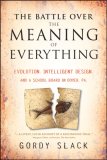Gordy Slack, The Battle Over the Meaning of Everything: Evolution, Intelligent Design and a School Board in Dover, PA. (Wiley, 2007) ISBN 978-0-7879-8786-2
While several books have been written about Intelligent Design, and a (smaller) number about the Kitzmiller trial, Slack’s account is unique in that he examines the town of Dover, the events, personalities, motivations and strategies involved with the trial in addition to the trial itself and Intelligent Design as a theory. Moreover, Slack uses his account of the controversy in Dover as a lens, examining the tensions of the culture war, and also his relationship with his father, a convert to evangelical Christianity. This examination; by turns microcosmic, by turns macrocosmic, could easily have led to a muddled account of the trial itself. Slack avoids this trouble, recounting the facts with clarity and journalistic precision, but also with a welcome wryness and sense of humor which is particularly welcome on a book dealing with such a controversial subject.
Though the book does examine the trial, it does not begin with opening arguments, or even a precis of the controversy. Slack’s account begins with the stirrings of unrest in Dover recounting such events as the 2002 burning of a student mural featuring a depiction of ape-hominid evolution inspired by “The March of Progress”, the oft-parodied cultural icon showing “nine nearly life-size bipedal figures running across the savanna, from left to right on the mural, representing different stages of early hominid evolution…. a take-off on the classic evolutionary progression image”. Slack goes on to recount the school board’s actions, culminating in the celebrated trial – which Slack reports from pretrial strategy to Judge Jones’ opinion, and subsequent school board elections and current community resolution.
Slack does not pretend to be neutral. Quite the opposite, he states his approach and point of view clearly at the beginning of the book. That this colors his perceptions is unarguable as well as unavoidable. His presentation of his non-neutral point of view enhances the honesty of his account, and makes the point that everyone – in the town of Dover as well as in America as a whole, approaches the trial of Science v. Faith subjectively. As one Intelligent Design proponent interviewed in the book put it, “There is a war going on in our culture. One side says that God made man, and the other side says that man made God”. If this is truly a culture “war”, then it is a civil war as well, and there are few, if any, neutral parties.
Frank S. Ravitch, Masters of Illusion: The Supreme Court and the Religion Clauses. (New York University Press, 2007) ISBN 978-0814775851
The issue of neutrality is one that Ravitch takes issue with. In fact, his second chapter baldly proclaims that “Neutrality, whether formal or substantive, does not exist in the religion clause context,”. He goes on to observe that “Claims of neutrality cannot be proven. There is no independent neutral truth to baseline to which they can be tethered. This is important because it means that any baseline to which we attach neutrality is not neutral, and claims of neutrality built on these baselines are by their nature not neutral.” Ravitch is similarly suspicious of hard originalism, finding that originalist analysis often ends up in a “battle of the framers”. Observing that, “short of inventing a time machine and bringing a cadre of pollsters from Gallup back in time, it is unlikely that we will ever know what the framers intended about the wide array of specific issues confronting courts in the religious clause context”.
Taken together, the ideals of neutrality and originalism are two major bulwarks of religious clause interpretation in modern federal jurisprudence. Examining contemporary issues such as the display of crosses on public grounds, the display of the Ten Commandments and school prayer, Ravitch illustrates their weaknesses, noting that, “the current approach of relying on often unsubstantiated interpretive devices … has not led to great clarity or a better understanding of religion clause interpretation. Claiming that original intent or neutrality supports a position is not the same as proving it, and when one’s evidence for these approaches can be easily countered by judges or commentators who hold a different perspective, the likelihood of confusion is greater.”
Contending that “multiple, narrow principles of interpretation can lead to more clarity, consistency, and coherence in religious clause interpretation”, Ravitch draws upon the work of Philip Bobbitt in advancing the use of what Ravitch terms the “modal approach” in order to find a more equitable and just approach to the interpretation of the religion clauses. Ravitch advances the use of principles such as separationism, accommodationism, liberty, equality, “soft” originalism (defined as the broad intent of the framers) and pragmatism as narrow, cooperative principals rather than broad, exclusionary ones in order to lead to ” better, or at least more realistic, legal reasoning”.
In contrast to Slack’s approachable, journalistic style, Ravitch writes in a manner more characteristic of legal scholarship. His prose is dense, closely reasoned and in places difficult. However, this book will undoubtedly find a place in a specialist collection, particularly in a law school collection that focuses on religion clause jurisprudence. Slack’s more accessible style and clear manner of writing makes this book suitable for both the specialist and the general audience.

| The Battle Over the Meaning of Everything: Evolution, Intelligent Design, and a School Board in Dove Author: Gordy Slack Binding: Hardcover List price: $24.95 Amazon price: $37.88 |

| Masters of Illusion: The Supreme Court and the Religion Clauses Author: Frank Ravitch Binding: Hardcover List price: $50.00 Amazon price: $50.00 |


